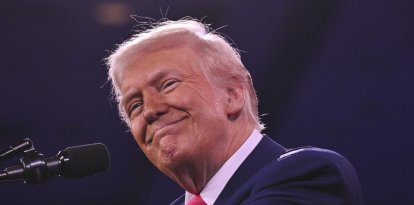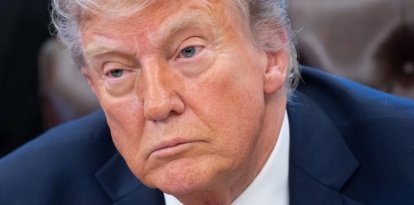What happens if there is a tie between Trump and Harris in the electoral college?
The Twelfth Amendment provides for this scenario, which occurred only in the 1824 presidential election.

In 1824, neither candidate reached 270 electoral votes to claim victory - Brenden Smialowski.
Donald Trump and Kamala Harris will face off at the polls on Tuesday, Nov. 5, to determine the new president of the United States. The Republican and Democrat are going through the final week of campaigning with their calculators in hand for election night. To reach the White House, they will have to reach 270 votes in the electoral college.
Days before the election, polls show a tied scenario although with the trend in favor of the Republican. For example, the most accurate 2020 survey has Trump leading in all key states: Pennsylvania, Michigan, Wisconsin, Nevada, Arizona, Georgia and North Carolina.
However, if Trump wins North Carolina, Michigan and Pennsylvania and Harris does the same in Georgia, Nevada and Wisconsin, the two will end up tied with 269 electors. This scenario would invoke the Twelfth Amendment for the first time in 200 years.

Politics
Northampton and Erie: The Pennsylvania counties that could define the presidential election
Joaquín Núñez

What happens if there is a tie in the electoral college?
In the event that Trump and Harris end up tied in the electoral college, the decision would go directly to Congress. This is known as a 'contingent election' and works as follows.
If no one reaches 270 electors, it will be the House of Representatives that elects the president and the Senate that elects the vice president.
According to the Twelfth Amendment, congressmen may vote among the three candidates who received the highest number of electoral votes. However, the vote is not individual but by proxy. That is, the vote is by state and not by representative.
For example, Florida currently has 28 congressmen in the House of Representatives. In the event of a contingent election, those 28 congressmen will vote and from their internal decision will come the vote of the state of Florida. In terms of Trump and Harris, if the outcome is 16-12 in favor of the Republican, Florida's vote will go to him.
This process is repeated with the other 50 states and out of that will come the winner. In this process, 26 votes must be reached to be proclaimed as the new president, since it is half plus one out of fifty states. Although Washington DC participates in the electoral college, it does not participate in this process because it is not a state.
In turn, the Senate will elect the vice president by a simple majority as if it were a law. All one hundred members vote and the option with more than fifty votes wins.
The only contingent election in history
Of all the presidential elections in U.S. history, only in one did Congress have to intervene. It was in 1824, when Andrew Jackson and John Quincy Adams faced off.
At that time the electoral votes totaled 261 and the magic number was 131. However, when the votes were finished being counted, Jackson had 99 electoral votes and Adams had 84, so neither had the numbers in their favor. In terms of the popular vote, Jackson prevailed by nearly eight percentage points.
The decision then went to Congress and the 24 states that then made up the union. In the end, Adams won a majority of 13 votes in favor in the House of Representatives thanks to the votes of Connecticut, Illinois, Kentucky, Louisiana, Maine, Maryland, Massachusetts, Missouri, New Hampshire, New York, Ohio, Rhode Island and Vermont.
For its part, the Senate elected Adams' running mate, John C. Calhoun, as vice president in what was the only contingent election in U.S. history.
RECOMMENDATION























